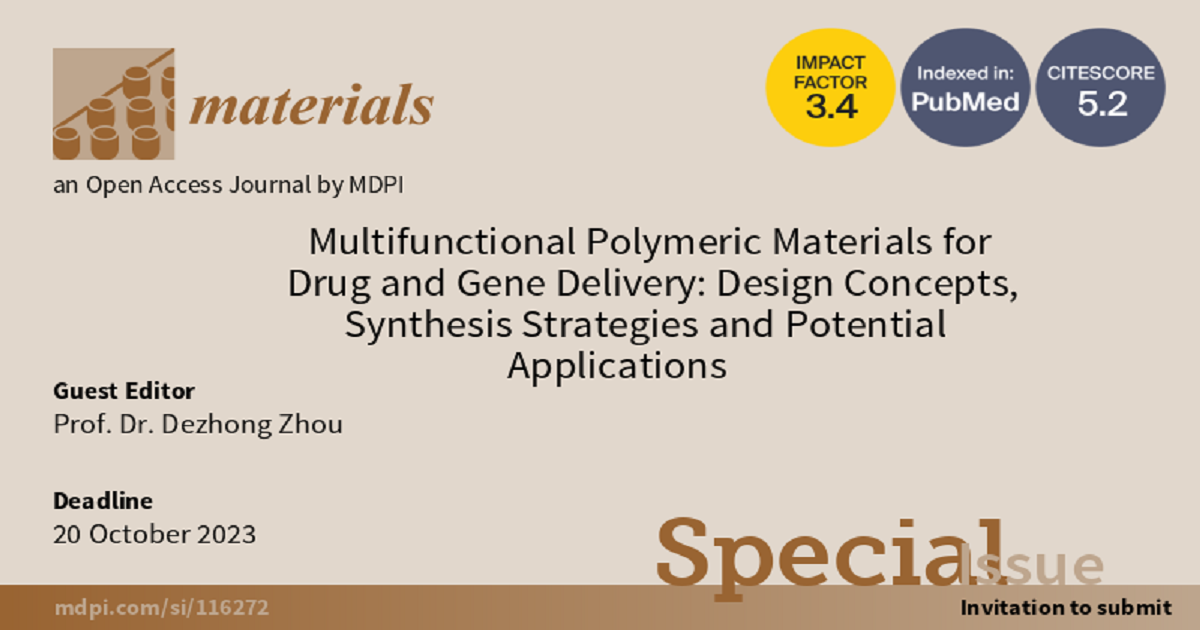- 3.2Impact Factor
- 6.4CiteScore
- 16 daysTime to First Decision
Multifunctional Polymeric Materials for Drug and Gene Delivery: Design Concepts, Synthesis Strategies and Potential Applications
This special issue belongs to the section “Biomaterials“.
Special Issue Information
Dear Colleagues,
Drug and gene delivery have shown their promise in the treatment of various inherited and acquired diseases, the development of vaccines and tissue regeneration. Safe and efficient drug and gene delivery to target cells and tissues remains a major challenge. The development of clinical realiable drug and gene delivery systems would greatly expidite the translation of drug and gene therapies from bench to bedsides. Compared with other counterparts, multifunctional polymeric materials (such as polymers, liposomes, peptides and inorganic nanoparticles), due to their wide availability of starting materials, flexibility in composition and structure, high safety and non-immunogenicity and scalable synthesis, have attracted significant attention for drug and gene delivery during the last three decades. With the recent progress in chemistry, a series of advanced synthesis strategies have been proposed, many new multifunctional polymeric drug and gene delivery materials have been prepared, and the drug and gene delivery efficiency and safety profiles have been substantially improved. Especially, numerous clinical trials are ongoing. In this Special Issue, we are soliciting original research papers and review articles which cover these new progresses in the field, especially the emerging synthesis strategies, the in-depth understanding of chemical composition/structure and physiological properties of the multifunctional polymeric materials, encouraging in vitro and in vivo evaluation of the developed polymeric materials for drug and gene delivery, and the potential challenges in translating the multifunctional polymeric materials from bench to clinical settings, with the expectation to provide new insights into the development of next generation of polymeric materials for drug and gene delivery.
And the Guest Editor Assistants for this special issue is:
Zhili Li
School of Chemical Engineering and Technology (SCET), Xi'an Jiaotong University, Xi'an 710049, China
Interests: hyperbranched polymers; cyclized polymers; biomaterials; hydrogels; microcarriers
Prof. Dr. Dezhong Zhou
Guest Editor
Manuscript Submission Information
Manuscripts should be submitted online at www.mdpi.com by registering and logging in to this website. Once you are registered, click here to go to the submission form. Manuscripts can be submitted until the deadline. All submissions that pass pre-check are peer-reviewed. Accepted papers will be published continuously in the journal (as soon as accepted) and will be listed together on the special issue website. Research articles, review articles as well as short communications are invited. For planned papers, a title and short abstract (about 250 words) can be sent to the Editorial Office for assessment.
Submitted manuscripts should not have been published previously, nor be under consideration for publication elsewhere (except conference proceedings papers). All manuscripts are thoroughly refereed through a single-blind peer-review process. A guide for authors and other relevant information for submission of manuscripts is available on the Instructions for Authors page. Materials is an international peer-reviewed open access semimonthly journal published by MDPI.
Please visit the Instructions for Authors page before submitting a manuscript. The Article Processing Charge (APC) for publication in this open access journal is 2600 CHF (Swiss Francs). Submitted papers should be well formatted and use good English. Authors may use MDPI's English editing service prior to publication or during author revisions.
Keywords
- gene therapy
- non-viral gene vectors
- transfection efficiency
- safety profile
- clinical translation

Benefits of Publishing in a Special Issue
- Ease of navigation: Grouping papers by topic helps scholars navigate broad scope journals more efficiently.
- Greater discoverability: Special Issues support the reach and impact of scientific research. Articles in Special Issues are more discoverable and cited more frequently.
- Expansion of research network: Special Issues facilitate connections among authors, fostering scientific collaborations.
- External promotion: Articles in Special Issues are often promoted through the journal's social media, increasing their visibility.
- Reprint: MDPI Books provides the opportunity to republish successful Special Issues in book format, both online and in print.


